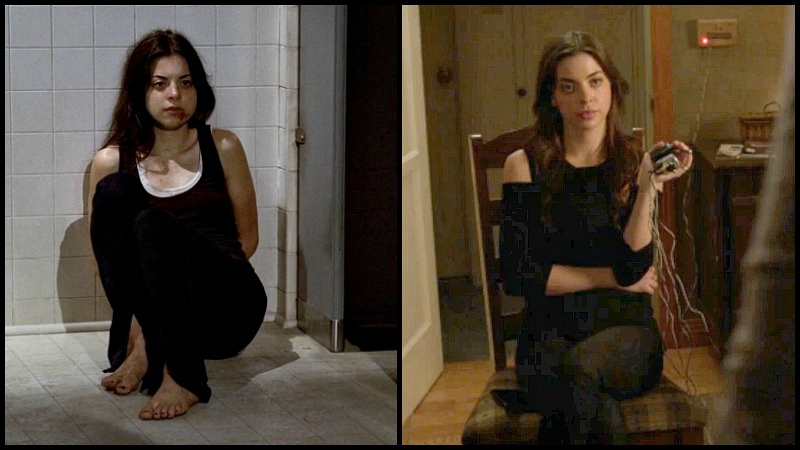This episode of Feud: Bette and Joan, titled “You Mean All This Time We Could Have Been Friends?” might exist as the finale. The real emotional end, though, was in the penultimate episode, “Abandoned.” The finale of Feud is not without its moments, and most of them involve Joan Crawford, but it is really more about tying up the loose ends than coming to a proper conclusion. The lack of satisfaction may be intentional because Feud paints a very dour picture of the conclusion of Joan and Bette’s rivalry, as it ends with Joan Crawford’s premature death.
Is Feud: Bette and Joan Better at Campy Fun or Serious Emotion? >>>
The End of Joan Crawford
Joan’s fake sickness during Charlotte really was the beginning of the end for her, as it soon gives way to real sickness. The finale opens on Joan a few years down the line from Hush … Hush, Sweet Charlotte. Joan is living alone in a small apartment, with a smaller puff of a dog, and she is dying. She is forced to do a movie called Trog, which is exactly as awful as the title makes it sound, and this is her last movie ever. Joan is too obsessed with her looks and too ill to be seen in public anymore. Feud has done a lot to make Joan Crawford into a sympathetic figure, but the tragedy is on overload at the end. Jessica Lange looks less like a glamorous movie star and more like old Rose from Titanic … who has gone through 10 rounds in a boxing match.
Luckily, like all fictional cancers, Joan’s cancer allows her to have dramatically significant and emotional hallucinations. A week before Joan dies, she imagines that Jack Warner and Hedda Hopper (both who are already dead) are sitting in her apartment playing cards. They exist as the two sides of Joan’s life, the personal and the professional, or at least as personal as it got for Joan. During the hallucination, Jane realizes that she doesn’t know herself at all, even as she is dying. Joan spent so much time creating the image of Joan Crawford that she doesn’t know how to be alone or how to even be herself. She breaks down in tears, and it is heartbreaking.
If that’s not emotional enough, Bette arrives into the hallucination. This is all happening in Joan’s mind, so the closure is sort of meaningless. Yet the fake-ish Joan and the fake Bette bury the hatchet, realizing after all this time that they should have been friends. Feud has really parsed out the scenes of Joan and Bette sharing the screen together. It is probably no mistake that this scene is their longest yet, and it is the most emotional. Bette might be a figment of Joan’s mind, but Susan Sarandon imbues all the history and sadness into Bette that would be there in real life while reconciling with Joan. Just as Joan declares to the fake Bette that they can start over, Mamacita arrives and disrupts the illusion. Mamacita ushers a confused and pathetic Joan to bed. This is the last time Joan Crawford is seen alive on Feud: Bette and Joan.
Quiz: Which TV Sidekick Are You? >>>
An End for Bette Davis
With Joan truly gone, things switch over solely to Bette. As good as it is to get some uninterrupted Sarandon-as-Davis action, the whole sequence feels like an afterthought. There is an attempt to make Bette as sad as possible here, and some of it works. Bette’s relationship with daughter B.D. completely erodes after Bette physically disciplines one of B.D.’s sons. Weirdly, the whole affair does nothing to make B.D. look sympathetic. Feud has always presented B.D. as sort of a dramatic brat, though it’s not particular surprising. Cut off from B.D., Bette starts spending time with her other daughter, Margot. Margot is so mentally challenged that she barely recognizes or acknowledges Bette as her mother. This is sad but also rather forced since Feud makes no mention of Bette’s real life other child, her son Michael.
The one part of this Bette epilogue that Feud does nail is her reaction to Joan’s death. Bette never processes her very complicated feelings about Joan. She is regretful about never forgiving Joan while the woman was alive but also does nothing to make it better afterwards. She is in pure denial. There might be no teary confession at Joan’s graveside, but there doesn’t need to be one. Bette’s uncomfortable reactions to Joan after Joan’s death tell us all we need to know. While Joan’s imagined reconciliation might have been fake, it would have been real if Bette could have been brave enough to do it.
Bette does make one small stand for Joan. At the Academy Awards, she is approached by the awful documentary crew who have been giving us the terrible framing device all season. Bette refuses to participate. This might all be part of Bette’s denial; she can’t face talking about Joan or Joan’s death in public. I choose to see things differently. Bette is getting the satisfaction of not letting the documentary sensationalize or exploit her complicated relationship with Joan.
What did you think of the finale? Were you satisfied with the way everything played out? Why do you think Bette refused to participate in the documentary? Did Joan’s death move you? What did you make of the scenes with B.D.? Let us know what you think in the comments section below.
Want more news? Like BuddyTV’s Facebook page.
(Image courtesy of FX)

Contributing Writer, BuddyTV
Derek is a Philadelphia based writer and unabashed TV and comic book junkie. The time he doesn’t spend over analyzing all things nerdy he is working on his resume to be the liaison to the Justice League.

